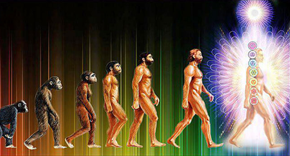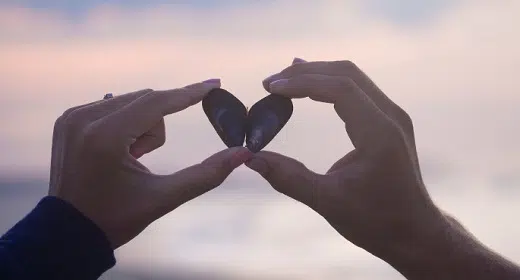by Jessica Schrader: How to respond from love and not react from fear in our relationships…
Reject fear, choose love. This is a popular refrain and wonderful advice. Many believe that there are only two primal emotions in the human being, love and fear, and that we cannot feel both at once. And, that in the same way that light removes darkness, love can remove fear.
The choice to reject fear and choose love can feel like something that only applies to moments of crisis, when we’re leaving a marriage, starting a new business, preparing to climb Mount Everest. But in truth, the opportunity to choose love and reject fear presents itself in the smallest moments of life, and specifically, in relationships with those closest to us. Love over fear is a choice every time someone tells us something about ourselves or has an experience of us that we don’t want to hear.
article continues after advertisement
We hurt each other in intimate relationships—intentionally and unintentionally—that’s a fact. Sometimes, if we’re lucky, we discover that we have hurt the other person when they come to us and share their pain, express their experience, and verbalize what we said or did that upset them. But often we discover that we have hurt the person through a different avenue, that is, when they criticize us or tell us what (they think) is wrong with us. In these cases, we generally feel blamed or attacked, and as a result, it can be more challenging to listen, imagine the situation through their eyes, and often impossible to empathize with their pain. We have a tendency in these situations to strike back (the best defense is a good offense) or alternatively, defend ourselves and prove the other person wrong. It’s a survival instinct and indeed, it can feel as if our very survival is at stake.
What’s at stake is not our physical survival, but the survival of our version of ourselves. The person we are being characterized or experienced as is not the person we think or believe ourselves to be. And so, we try to protect the identity of the good self, the self who is innocent, not to blame for what is being accused.
It’s a healthy instinct to question accusations that feel unfair or unwarranted. It’s also important to be able to set boundaries that prevent others’ projections and deflections from landing on us. If you are being assigned intentions that don’t belong to you, it’s important to be clear about your truth. It’s also healthy and necessary to protect yourself from pain that takes the form of emotional attack. Emotional attacks and insults, meant to harm, are not OK, and need to be stopped. This is not an article about learning to be a doormat in service of some false spiritual goal.
And yet, there is an enormous opportunity in these relational moments, when someone we care about is hurt, and when (whether we understand it or not) we seem to be a part of their pain. There is an opportunity in these situations to choose to respond from love rather than react from fear.
When we feel emotionally attacked, blamed, or criticized in some way, we experience fear, even if we are not consciously aware of it. Our ego is threatened. Our identity is threatened. Our narrative on our self is threatened. Conflict feels dangerous to the survival of the ego organism. As a result, we react from the place of fear, which means defending our ego or attacking back, attempting to disable the threat. Fear, as a primal emotion, can sweep over us like a tsunami and cause us to react without thinking or consulting our more evolved and loving self. Our reaction is often out of alignment with how we feel, in our heart, about this other person.
If we want to choose love over fear as a life practice, we don’t have to wait for a crisis situation. We can simply use the opportunity presented in these tiny moments that happen every day, at all different levels—when the person we imagine ourselves to be, see ourselves as, doesn’t align with how we are being seen in that moment.
To choose love in these situations is to first, pause and take a full breath before doing anything. It is to stop and get quiet, to do our best to actually hear what the other person is saying without defending our version of who we are or what we think happened. It also means refraining from attacking back with a criticism of the other, or with something that they did or said (related or unrelated) that hurt us equally. It is to just listen—without conditions.
Operating from love is to set our own ego aside long enough to listen to the experience of the other, to be courageous enough to be willing to try and understand what the other person is experiencing, no matter how radically different it is from what we intended to happen, think happened, or believe was the cause of what happened. It is to have the strength of heart to understand and open our heart to what the pain is that the other is skillfully or unskillfully trying to express. A response (not reaction) that comes from love is listening to the other’s upset as if we were just ears hearing, ears alone, not ears attached to a head, attached to an ego, attached to an identity, attached to a person intent on remaining intact and unchanged.
To live from love not fear, on a practical level, is to shift from a goal of protecting our ego, being right, winning the argument, being not to blame, and move into actually being kind, being loving—in our actions. It is to be willing to stop proving that we’re a good person and actually be that good person—to be courageous enough to open our heart and be love even when our ego is screaming in fear.
And amazingly, in the moments when we have the strength to choose love over fear, we are rewarded not only with the knowledge and confidence that we have done something incredibly challenging and beautiful, but also, with the gift of experiencing ourselves as love, and something infinitely more than just the small, fragile ego we thought we were and so desperately needed to protect. We are rewarded with a freedom that surpasses all other freedoms. Ultimately, it is through our willingness to stop defending our idea of ourselves that we discover our true and indestructible self.
Source: Psychology Today










































